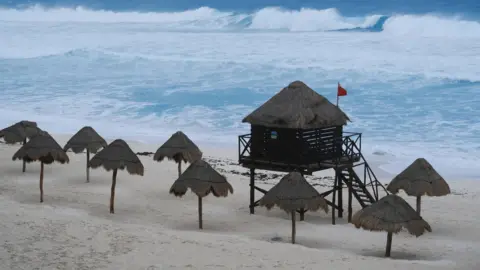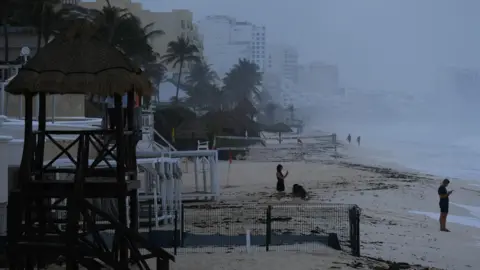[ad_1]
By Ian Aikman, BBC News
 Reuters
ReutersA hurricane which has wreaked havoc across the Caribbean, destroying property and leaving homes without power, is set to hit Mexico’s Yucatán Peninsula.
Hurricane Beryl, a category three storm, is making landfall early on Friday morning, affecting the area’s two million residents and the tourist hotspots of Cancún and Tulum.
Beaches are closed and thousands of troops have been deployed to help as the storm hits the country’s southeast shoreline.
The US National Hurricane Center (NHC) said the region can expect “dangerous” conditions to “begin shortly” in an announcement at 0100 CDT (0600 GMT) on Friday.
It said the area will see “hurricane-like winds, dangerous storm surge, and damaging waves”.
Across the Caribbean, at least ten people are known to have died and more are missing, roofs have been torn from buildings, and thousands of homes were left without power.
 Reuters
ReutersMexican authorities have taken measures to prepare the coastline for the hurricane.
Schools have been closed, hotel windows have been boarded up, and emergency shelters have been set up for locals and tourists in areas facing the brunt of the impact.
Residents in Cancún have rushed to supermarkets to stock up on supplies, with some encountering empty shelves on their visits.
More than 8,000 troops from the army, air force and national guard have been deployed in the Yucatán Peninsula to provide support to the population.
Hundreds of tourists have been evacuated and about 100 flights from Cancún airport have been suspended.
“They cancelled our flight and we had to pay for two extra nights,” said Virginia Rebollar, a Mexican tourist who travelled to Tulum with three family members.
“We have some fear, but we are convinced that people are prepared and know what to do,” she told the AFP news agency.
 Reuters
ReutersAs well as leaving a trail of destruction in its wake, Hurricane Beryl has also broken records.
It is the first hurricane to reach the category four level in June since NHC records began and the earliest to hit category five – the highest category – in July.
Hurricane Beryl’s record-breaking nature has put the role of climate change in the spotlight.
The causes of individual storms are complex, making it difficult to fully attribute specific cases to climate change.
But exceptionally high sea surface temperatures are seen as a key reason why Hurricane Beryl has been so powerful.
King Charles III said he had been “profoundly saddened” by the destruction the hurricane had caused in the Caribbean, impacting several Commonwealth islands.
The Royal Navy has sent an aid ship to the Cayman Islands to provide support to communities damaged by the hurricane on Thursday.
This came after Hurricane Beryl battered Jamaica on Wednesday and caused huge devastation across other Caribbean nations earlier in the week.
About 90% of homes were destroyed or severely damaged on Union Island, which is part of St Vincent and the Grenadines.
Where will Hurricane Beryl go next?
After tearing through the Yucatán Peninsula, the storm will travel over the Gulf of Mexico, possibly reaching the country’s northeast coast on Sunday morning.
It could also reach Texas, where officials warned residents to prepare for the possibility of Beryl’s arrival this weekend.
Governor Greg Abbott told resident’s near the state’s Atlantic coast to “keep an eye on the gulf” and “have an emergency plan to take care of yourself and your loved ones”.
The US National Oceanic and Atmospheric Administration has warned that the North Atlantic could get as many as seven major hurricanes this year – up from an average of three in a season.
[ad_2]
Source link freeslots dinogame telegram营销




